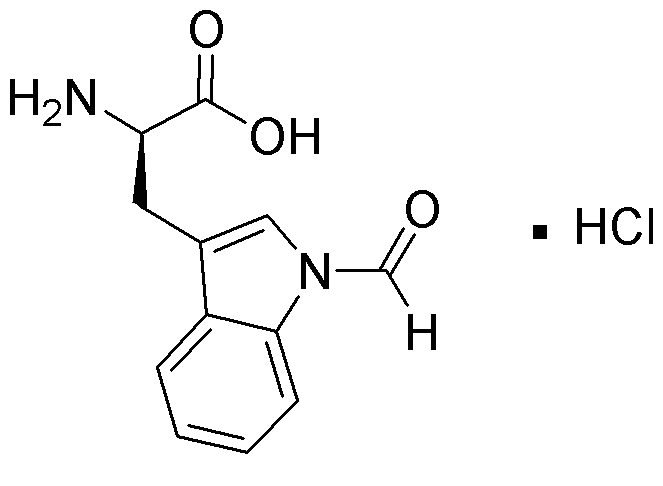Nin-Formyl-D-tryptophan hydrochloride is widely utilized in research focused on:
- Peptide Synthesis: This compound is used as a building block in the synthesis of peptides, particularly those that require specific structural configurations. Its unique formyl group allows for selective reactions, making it valuable in creating complex peptides for therapeutic applications.
- Neuroscience Research: It plays a role in studies related to neurotransmitter function and receptor interactions, particularly in the context of serotonin pathways. This can aid in understanding mood disorders and developing potential treatments.
- Drug Development: The compound is explored in the development of new pharmaceuticals, especially those targeting neurological conditions. Its ability to mimic natural compounds can enhance the efficacy of drug candidates.
- Biochemical Assays: It is utilized in various biochemical assays to study enzyme activity and protein interactions. This application is crucial for researchers looking to understand metabolic pathways and disease mechanisms.
- Antioxidant Studies: Researchers investigate its antioxidant properties, which can lead to applications in developing supplements or treatments aimed at reducing oxidative stress in cells, potentially benefiting various health conditions.
Información general
Propiedades
Seguridad y normativas
Aplicaciones
Nin-Formyl-D-tryptophan hydrochloride is widely utilized in research focused on:
- Peptide Synthesis: This compound is used as a building block in the synthesis of peptides, particularly those that require specific structural configurations. Its unique formyl group allows for selective reactions, making it valuable in creating complex peptides for therapeutic applications.
- Neuroscience Research: It plays a role in studies related to neurotransmitter function and receptor interactions, particularly in the context of serotonin pathways. This can aid in understanding mood disorders and developing potential treatments.
- Drug Development: The compound is explored in the development of new pharmaceuticals, especially those targeting neurological conditions. Its ability to mimic natural compounds can enhance the efficacy of drug candidates.
- Biochemical Assays: It is utilized in various biochemical assays to study enzyme activity and protein interactions. This application is crucial for researchers looking to understand metabolic pathways and disease mechanisms.
- Antioxidant Studies: Researchers investigate its antioxidant properties, which can lead to applications in developing supplements or treatments aimed at reducing oxidative stress in cells, potentially benefiting various health conditions.
Documentos
Hojas de datos de seguridad (HDS)
La SDS proporciona información de seguridad completa sobre la manipulación, el almacenamiento y la eliminación del producto.
Especificación del producto (PS)
La PS proporciona un desglose completo de las propiedades del producto, incluida la composición química, el estado físico, la pureza y los requisitos de almacenamiento. También detalla los rangos de calidad aceptables y las aplicaciones previstas del producto.
Certificados de análisis (COA)
Busque certificados de análisis (COA) ingresando el número de lote del producto. Los números de lote y de partida se pueden encontrar en la etiqueta de un producto después de las palabras "Lote" o "Lote".
Número de catálogo
Número de lote/lote
Certificados de origen (COO)
Este certificado de origen confirma el país en el que se fabricó el producto y también detalla los materiales y componentes utilizados en él y si se deriva de fuentes naturales, sintéticas u otras fuentes específicas. Este certificado puede ser necesario para cumplir con las normativas aduaneras, comerciales y regulatorias.
Número de catálogo
Número de lote/lote
Hojas de datos de seguridad (HDS)
La SDS proporciona información de seguridad completa sobre la manipulación, el almacenamiento y la eliminación del producto.
DownloadEspecificación del producto (PS)
La PS proporciona un desglose completo de las propiedades del producto, incluida la composición química, el estado físico, la pureza y los requisitos de almacenamiento. También detalla los rangos de calidad aceptables y las aplicaciones previstas del producto.
DownloadCertificados de análisis (COA)
Busque certificados de análisis (COA) ingresando el número de lote del producto. Los números de lote y de partida se pueden encontrar en la etiqueta de un producto después de las palabras "Lote" o "Lote".
Número de catálogo
Número de lote/lote
Certificados de origen (COO)
Este certificado de origen confirma el país en el que se fabricó el producto y también detalla los materiales y componentes utilizados en él y si se deriva de fuentes naturales, sintéticas u otras fuentes específicas. Este certificado puede ser necesario para cumplir con las normativas aduaneras, comerciales y regulatorias.


